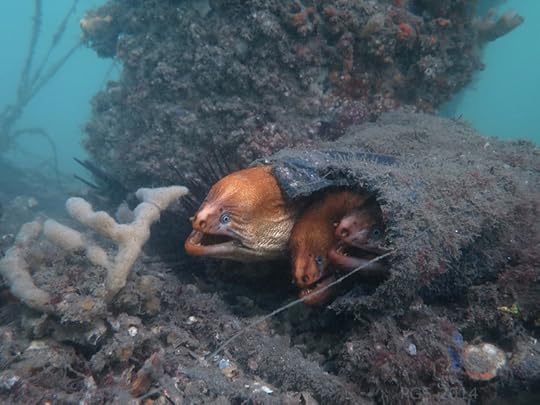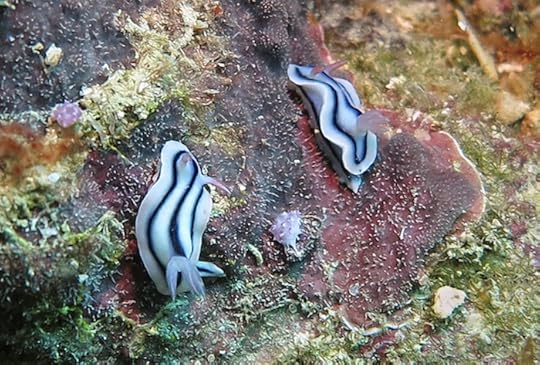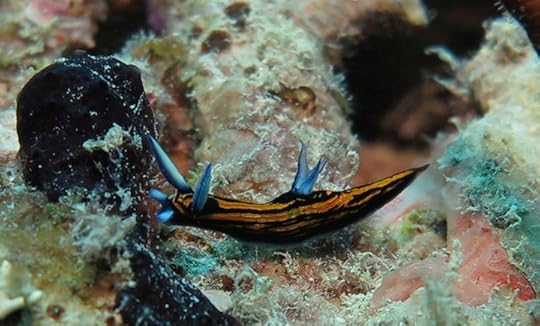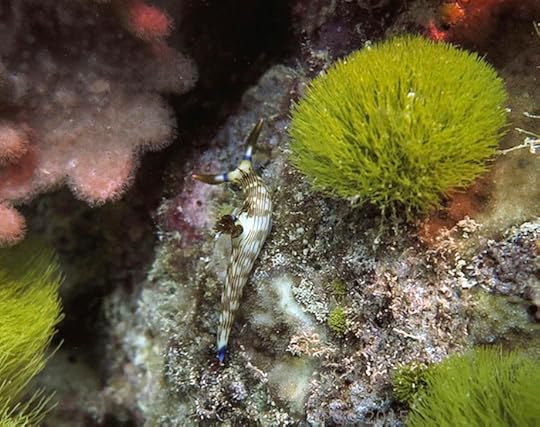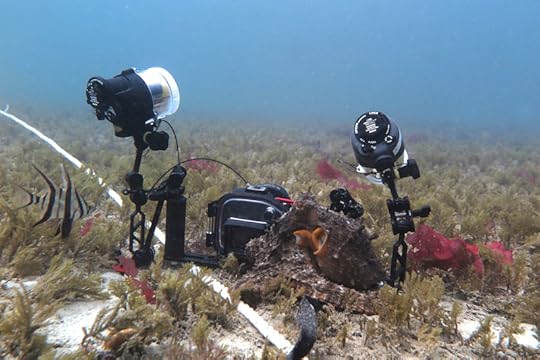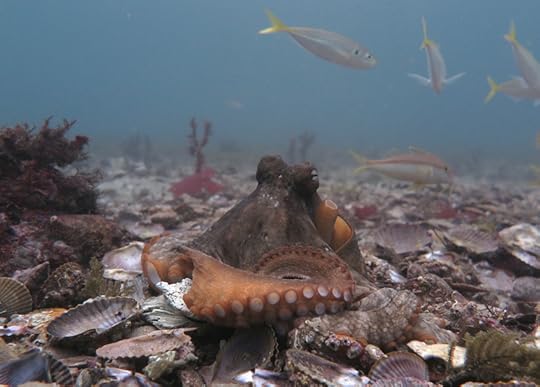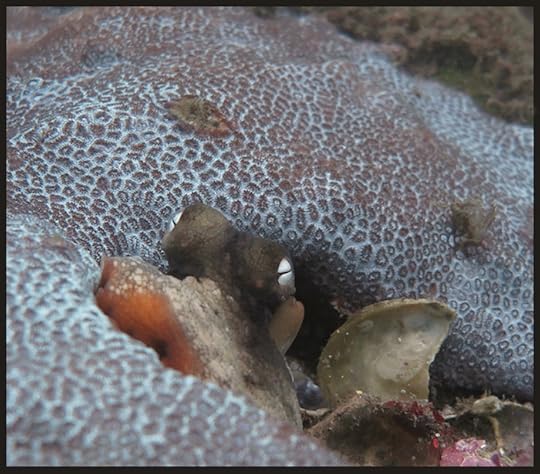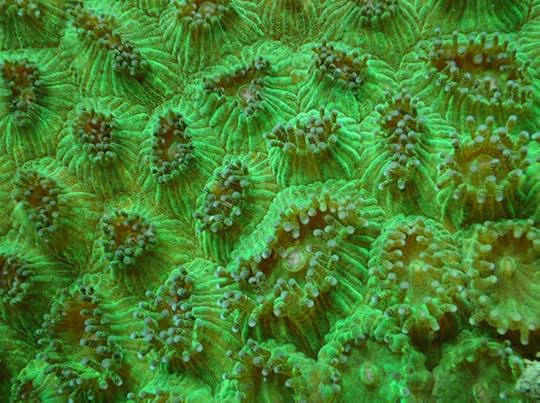Peter Godfrey-Smith's Blog, page 11
December 9, 2015
30. Three Eels
An occasional theme of this website and its predecessor has been coexistence, getting along. My impression is that close proximity between animals who might not always have the same interests, but fall into a low-key truce, might be more common in the sea than on land. This post is mostly for the photographs, which were taken a year or so ago at Chowder Bay in Sydney Harbor. The animals are Green Moray Eels, Gymnothorax prasinus. These three were sitting together, side by side, in a den that...
November 13, 2015
29. Early Nerves
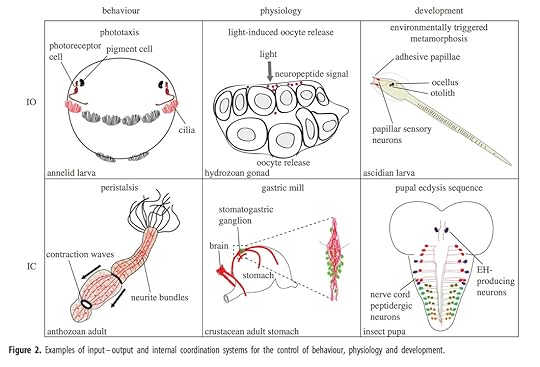 Earlier this week a special issue of the venerable journal Phil. Trans. R. Soc. appeared, with a collection of papers from a conferencein England I went to back in March. The issue contains a paper by Gáspár Jékely, Fred Keijzer, and myself, which we started writing at an earlier conference (the subject of another post) at Tübingen in Germany last year.
Earlier this week a special issue of the venerable journal Phil. Trans. R. Soc. appeared, with a collection of papers from a conferencein England I went to back in March. The issue contains a paper by Gáspár Jékely, Fred Keijzer, and myself, which we started writing at an earlier conference (the subject of another post) at Tübingen in Germany last year.
The aim of the paper is to chart an “option space” – an organized space of possibilities –for the early evolution of nervous systems. For me,...
November 5, 2015
28. Further Fijian Nudibranchs
This is a short photographic post to complete my catalogue of nudibranchs, and similar animals, seen in the waters of Fiji a few months ago. Above is a pair of Chromodorislochi, a repeat species from the earlier post, but irresistible.
All the nudibranchs here are very small animals, a centimeter or so long in some cases, a couple of centimeters in others.
Roboastra gracilis.According to Bill Rudman, Roboastra contains some predatory species who hunt down other nudibranchs.
October 13, 2015
27. Integrated Information
This octopus is inspecting the camera gear of my collaborator David Scheelat Octopolis, off the coast of Australia.Animal encounters machine. Did this feel like something for the octopus? How about for the machine? Perhaps the two of them together?
“Integrated Information Theory” (IIT) is a theory of the physical basis of consciousness developed by the neuroscientist Giulio Tononi and endorsed also by Christof Koch.Tononi has been at work on it since around 2008. This year there’s a new pape...
September 18, 2015
26. Océanologique
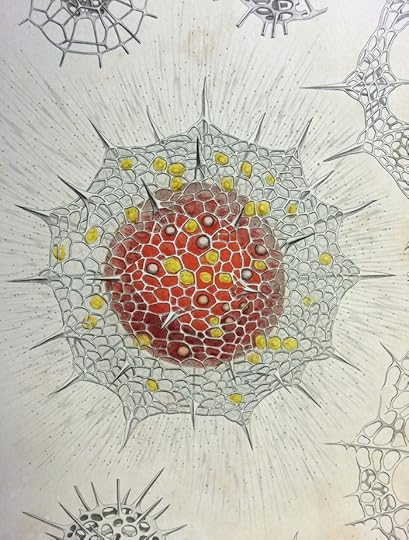 The marine station at Villefranche-sur-Mer, once an eighteenth century naval base,bathes in the light of the Mediterranean. I’ve returned from a very good conference there a week or so ago. Perhaps the most interesting part was a brief but intense debate I’m still thinking about, which concerned development in animals.
The marine station at Villefranche-sur-Mer, once an eighteenth century naval base,bathes in the light of the Mediterranean. I’ve returned from a very good conference there a week or so ago. Perhaps the most interesting part was a brief but intense debate I’m still thinking about, which concerned development in animals.
We also spent some time in the library, which has a complete set of the “Challenger” volumes, the fruit of a 1872-1876 expedition that pioneered oceanology. The HMS Challenger,...
August 20, 2015
25. The Octopus Genome and Neural Evolution
Last week an important octopus paper came out, reporting the firstsequencing of an octopus genome.It’s full of interesting findings. In this post I’ll pick up something that goes by quickly in the new paper, and has not been commented on much so far.
Large nervous systems evolved independently in animals like us and in octopuses. This raises questions about whether our brains do things the same way as their brains, or differently. One of the results in the new paper concerns how nervous syst...
July 28, 2015
24. Some Fijian Nudibranchs (and a Platyhelminth)
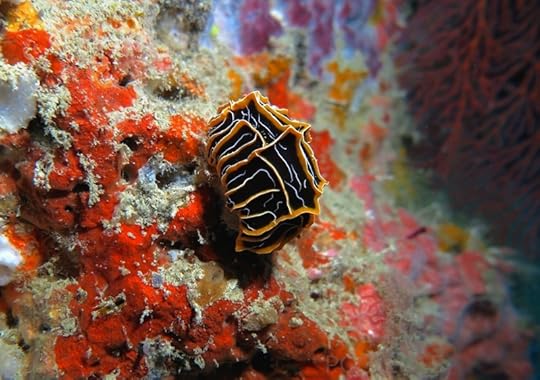 This post is photographic, fruits of a recent trip to Fiji.All the photos were taken in Bligh Waters, and all had some added light. Many of the animals were spotted, at a considerable distance, by Jesse of theWananavudive boat. The captions describe the photo above in each case. This is Reticulidiahalgerda.
This post is photographic, fruits of a recent trip to Fiji.All the photos were taken in Bligh Waters, and all had some added light. Many of the animals were spotted, at a considerable distance, by Jesse of theWananavudive boat. The captions describe the photo above in each case. This is Reticulidiahalgerda.
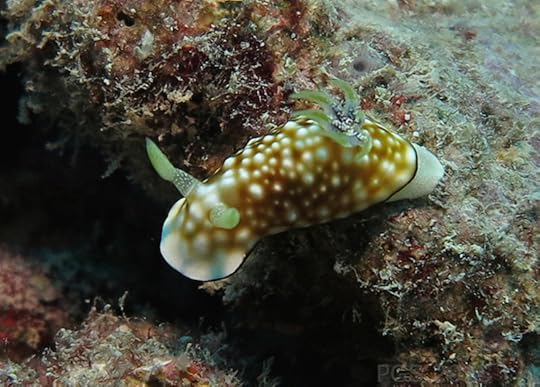 I think this isGoniobranchus, perhapsG. geometricusin a different color form from those seen round Sydney.
I think this isGoniobranchus, perhapsG. geometricusin a different color form from those seen round Sydney.
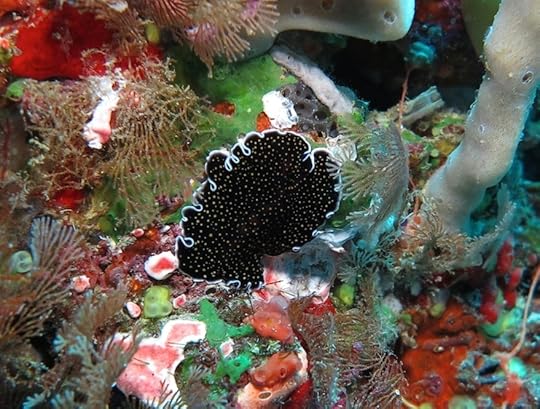 Thysanozoon nigropapillosum.This one’s a Platyhelminth, from an entirely differen...
Thysanozoon nigropapillosum.This one’s a Platyhelminth, from an entirely differen...
July 10, 2015
23. Cephalopod Color Update
This post is a break from the series reflecting on the early history of animals.It catches up on some cephalopods, where change has been afoot in the area of color.
A few weeks ago I published a review in the journal Animal Behavior of a new book, Cephalopod Cognition, a collection of papers edited by Anne-Sophie Darmaillacq, Ludovic Dickel and Jennifer Mather.* It’s a good collection, but in the review I said I was surprised at some things that weren’t grappled with in the book. One of thes...
June 25, 2015
22. Hypotheses about the Metazoa – 2
It’s a zoanthid colony – volcanos fringed with fingers.The photo is lit and magnified but the green is real (a shot of the colony from further away is here).Zoanthids are a kind of coral, so they are Cnidarians, along with jellyfish and anemones.
This post continues directly from the previous one, which was about a possible revision to our picture of the early history of animals. The revision being debated is about the sequence of early evolutionary branchings in this part of the tree of lif...
June 7, 2015
21. Hypotheses About the Metazoa – 1
The photograph above was taken by DavidLiittschwager for a project with National Geographic. Years ago it was also published in the Guardian newspaper, where I saw it while staying for some months in Manchester, England, far from the ocean.
The original caption in the magazine reads: “Under a magnifier, a splash of seawater teems with life. The planktonic soup includes bug-like copepods; long, glassy arrowworms; coiled filaments of cyanobacteria; rectangular algae called diatoms; fish eggs;a...
Peter Godfrey-Smith's Blog
- Peter Godfrey-Smith's profile
- 685 followers


